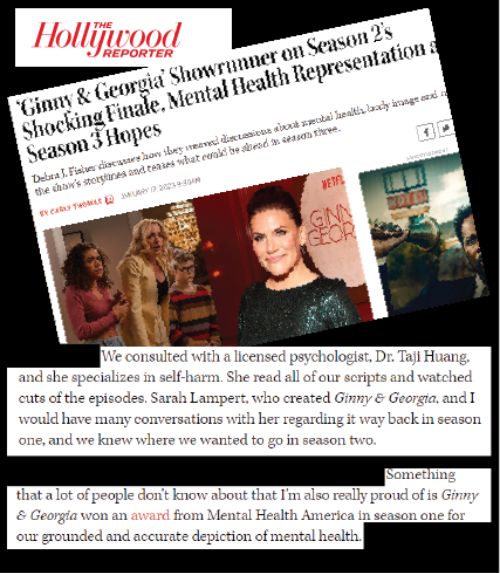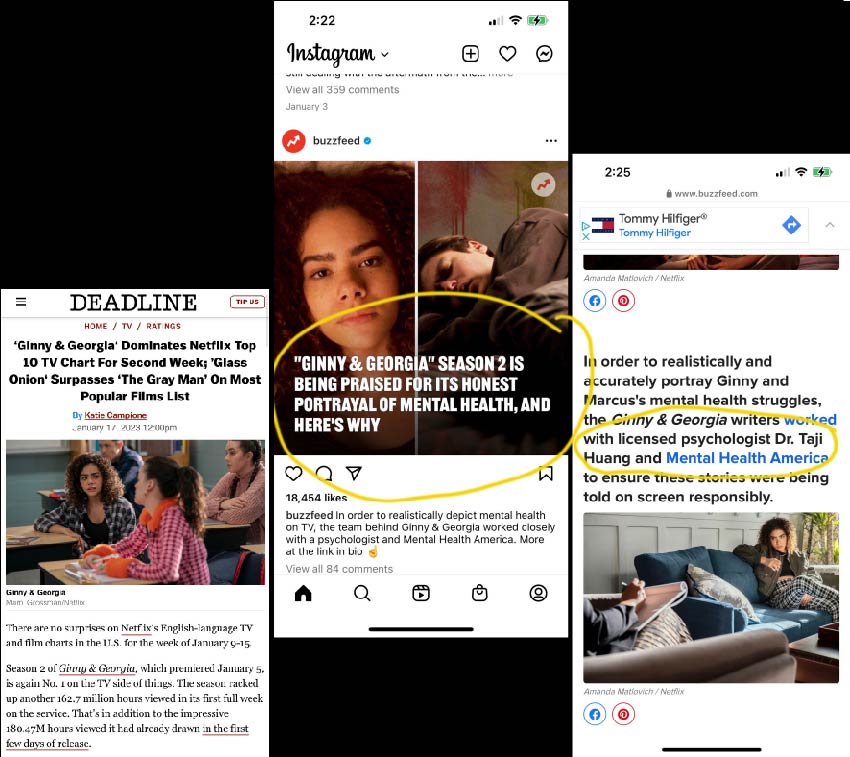TV & Film Consulting and Manuscript Reviews
If you want expert feedback on how to portray mental health issues in your film or TV show, look no further than Dr. Taji Huang in Glendale, CA. As a renowned psychologist, she offers manuscript reviews and media consulting services to help ensure that your project is as accurate and realistic as possible. If you want to schedule a consultation with psychology media consultant Dr. Taji for this type of work, please contact her directly by email or phone.
Media & Mental Health
The media industry has a troubling history when it comes to the portrayal of mental illnesses. Too often, these conditions are misrepresented and used as a source of cheap laughs. As a result, those who are struggling don’t feel seen or understood because of the stigma perpetuated by movies and TV shows.
Work On The Netflix Hit: Ginny & Georgia
Dr. Taji Huang has already made a positive impact in the television industry with her work on the Netflix show Ginny & Georgia. The first season even won Mental Health America’s 2021 Media Award for its realistic, empathetic, and heartfelt portrayal of mental health issues in teenagers!
Media Appearances
The important work as a psychology media consultant, Dr. Taji has been doing to consult on Ginny & Georgia has been highlighted in several high-profile magazines and news outlets, such as this piece from Variety. You can read more about her other media appearances here where she discusses mental health.
How Psychology Media Consultant Dr. Taji Huang Can Help
Dr. Taji helps by confronting harmful stereotypes and tropes and allows for the production teams to present these situations, conditions, and diagnoses in a factual and positive way – one that leads to affirming the real feelings, situations, and treatments available.
5 Harmful Tropes To Avoid
Here are some of the most common media stereotypes about mental health, followed by why they’re problematic.
- The “Psychotic Killer”
- The “Neat Freak” With OCD
- The “Tortured Artist”
- The Mean & Manipulative Person With BPD
- The Evil Psychiatrist/Therapist
1) Psychosis Rarely Leads To Violence
Although many movies depict people with schizophrenia or other psychotic disorders as dangerous or “criminally insane,” the truth is that the majority of people who experience psychosis are not violent. In fact, they’re more likely to harm themselves than to pose a threat to others.
Some films and TV shows use the term “psychopathic” with “psychotic” interchangeably. This is extremely harmful and misleading because psychosis (difficulty perceiving what’s real and what isn’t) has absolutely nothing to do with psychopathy (a subset of antisocial personality disorder characterized by callous and unemotional traits).
2) OCD Isn’t A Harmless Quirk
OCD is not a “cute little personality quirk” that causes people to be extremely clean or well-organized—rather, it’s a debilitating condition that causes significant suffering for those who have it. Moreover, not everyone who has OCD even cares about neatness. There are numerous OCD themes that have nothing to do with being clean or well-organized.
- Heightened Sense Of Responsibility
- Fear Of Causing Harm
- Unwanted Sexual Thoughts
- Relationship-Focused Anxiety
3) Artists Needn’t Be “Tortured”
Many films and TV shows feature a stereotypical artist who would not be able to produce artistic or musical masterpieces if it weren’t for their mental illness (usually depression or bipolar disorder). This stereotype is particularly harmful because it romanticizes the immense suffering these conditions can cause.
While it’s true that many people with mental illnesses are incredibly talented and may even be inspired to create art or music about their struggles, they would still be just as talented without such conditions. Not to mention, depressive episodes can be so debilitating that people are unable to get out of bed—let alone produce art.
4) Borderline Personality Disorder Is Not A Character Flaw
The stereotypes and immense stigma surrounding BPD need to end. In the absence of other comorbid personality disorders, BPD doesn’t cause people to be cruel or manipulative; rather, it causes extremely intense emotions and a fear of abandonment. People with BPD are capable of being kind and loving, they are more likely to harm themselves than others, and if they do something unkind it’s usually an unintentional impulsive response driven by their own emotional anguish.
5) Mental Health Practitioners Aren’t Evil
Gone are the days when people with mental health conditions were locked away forever in a dreaded “insane asylum,” where evil psychiatrists would perform unethical treatments against their patients’ will. Most modern psychiatrists and therapists are caring, compassionate individuals who joined their profession in order to help people.
Mental Health Consultations For Television Shows & Films
When it comes to how mental health is often portrayed, this list of harmful tropes only scratches the surface. The best way to ensure that your film or TV show depicts mental health issues accurately and holistically is to hire an experienced psychologist like Dr. Taji Huang. For quality TV script consulting and manuscript review, contact Dr. Taji today via phone, or email to schedule a meeting.














